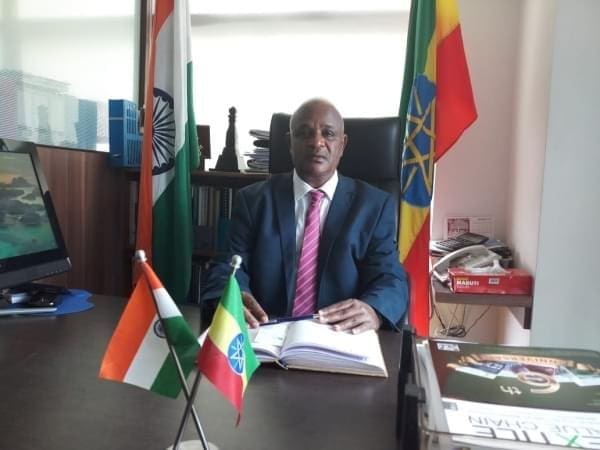“India is the second largest investor in Ethiopia following China in the Textile and manufacturing sector” Out of the 75 global companies in the country, there are 10 Indian companies running their manufacturing and operations. In a recent exclusive chat with Textile Value Chain, Consul General DemekeAmbulo, Ethiopian Consulate – Mumbai, says Ethiopia is safe for Indian investors.
Speaking on the political stability there, he said, “ There is a stable social-economic governance with sustained peace and security.An average of about 11% GDP growth since 2005, one of the fastest growing economies in the world during the same period There is a stable and conducive macroeconomic environment that implements a structural growth and transformation plan which aims to transform Ethiopia from an agriculture-led economy to an industrial one. “
According to the Consulate, there are more than 250 Textile and garment Industry in Ethiopia, out of which 75 are Foreign Direct Investments. Calling India the second largest investor in Ethiopia after China, he said, the Indian textile business owners should think on the comparative advantage for investment in Ethiopia for textile and garment.
Advantage Ethiopia:
According to the Consulate General, Ethiopia’s millennial population is more than 70 % and the wagerate are competitive which extends between 40 to 100 USD per month. “We are the second largest populations in Africa, with more than 110 million while we provide the cheapest and sustainable energy supply of 0.03 USD centsKW per hour. The other advantages include abundant water supply, duty-free, quota free access to USA Japan, Canada, China, Australia and more”, he said further jotting the incentive packages of duty free import of Capital goods, income tax exemption, tax holidays and development Bank of Ethiopia loan up to 50% Land/Shed with Competitive lease price at Industrial parks.
According to him, India and Ethiopia have long-standing economic and commercial relations, which are centuries old. He recalls during the Axumite Kingdom, Indian traders had links with the ancient port of Adulis in the eastern part of Ethiopia and traded silk and spices for gold and ivory. In recent years, with the opening up of the Ethiopian economy, business ties between the two countries have grown significantly, especially in the areas of trade, investment, agriculture and infrastructure projects. The economic dimension of the bilateral relationship has now become its most important.
Industrial parks and eco-friendly measures:
Ethiopia’s textile and apparel industry has experienced major development over recent years, mainly driven by the country’s wide availability of raw materials, cheap labour, low energy costs, and several bilateral trade agreements with the world’s biggest markets. According to the Consulate General, Ethiopia has specialized industrial park, maintaining high environmental standards through the use of renewable energy and zero liquid discharge (ZLD) technology.
“We have close to 15 industrial clusters and they have state-of-the-art eco-friendly policies and the investment climate is favourable for Indian companies. Needless to say, the connectivity has also improved and there are Indian businessmen who make a one-day trip to our country for business meetings, thanks to the daily flight options from India”, he said.
Safe to invest:
The consulate also assures investors a safe and secure climate for their business in Ehiopia. “We have many global organizations having their Headquarters in our country. Thus we are very much spotted in the global map for commerce. We had been culturally associated with India along with trade associations. With the stable government in place, our country is whole-heatedly welcoming Indian investors invest there”, he says.
Bilateral trade in 2015 stood at US$1.2 billion, of which India’s exports to Ethiopia were over US$1.15 billion and imports were US$65 million.
India is the second most important source of imports for Ethiopia, contributing 7.4% of all of Ethiopia’s imports next to China.Indian companies maintained their reputation as being in the top three foreign investors in Ethiopia with newer Indian multinationals marking their presence in Ethiopia. There are more than 600 Indian companies in Ethiopia with licensed investment of over US$ 5 billion of which more than half is estimated to be on the ground.
On a concluding note,on the ITME AFRICA 2020 in Addis Ababa , Ethiopia, he said his country is keen to realize the potential of Africa and Ethiopia as destination for textile manufacturing. We will be focussing on catalyse growth of textile industry in Ethiopia. Some of the key activities planned from Ethiopia in the event are B2B meetings, joint ventures, technology transfer, sourcing of equipment, machinery and other inputs for textile manufacturing and so on.
By: Swaminathan Balasubramanian , Editorial Assistant , TVC

